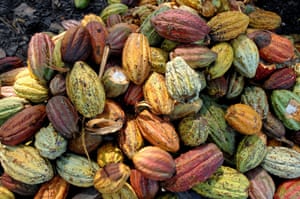Categories
Archives
- June 2024
- May 2024
- July 2023
- May 2022
- March 2022
- February 2022
- November 2021
- March 2021
- May 2020
- April 2020
- March 2020
- February 2020
- January 2020
- December 2019
- November 2019
- October 2019
- September 2019
- August 2019
- July 2019
- June 2019
- May 2019
- April 2019
- March 2019
- February 2019
- January 2019
- December 2018
- November 2018
- October 2018
- September 2018
- August 2018
- July 2018
- June 2018
- May 2018
- April 2018
- March 2018
- February 2018
- January 2018
- December 2017
- November 2017
- October 2017
- September 2017
- July 2017
- March 2017
The dark truth about chocolate
The dark truth about chocolate
Grand health claims have been made about chocolate, but while it gives us pleasure, can it really be good for us?

Chocolate has been touted as a treatment for agitation, anaemia, angina and asthma. It has been said to awaken appetite and act as an aphrodisiac. You may have noticed were still on the letter A.
More accurately, and to avoid adding to considerable existing confusion, it is the seeds of the Theobroma cacao tree that have, over hundreds of years, been linked to cures and therapies for more than 100 diseases and conditions. Their status as a cure-all dates back over 2,000 years, having spread from the Olmecs, Maya and Aztecs, via the Spanish conquistadors, into Europe from the 16th century.
The 19th century saw chocolate drinking become cheap enough to spread beyond the wealthy, the invention of solid chocolate and the development of milk chocolate. Later came the added sugar and fat content of todays snack bars and Easter eggs, which time-travelling Aztecs would probably struggle to associate with what they called the food of the gods.
Recent years have seen chocolate undergo another transformation, this time at the hands of branding experts. Sales of milk chocolate are stagnating as consumers become more health-conscious. Manufacturers have responded with a growing range of premium products promoted with such words as organic, natural, cacao-rich and single-origin. The packets dont say so, but the message were supposed to swallow is clear: this new, improved chocolate, especially if it is dark, is good for your health. Many people have swallowed the idea that its a superfood. Except it isnt. So how has this magic trick-like metamorphosis been achieved?
Its foundations lie in chocolate manufacturers having poured huge sums into funding nutrition science that has been carefully framed, interpreted and selectively reported to cast their products in a positive light over the last 20 years. For example, studies published last year found chocolate consumers to be at reduced risk of heart flutters, and that women who eat chocolate are less likely to suffer from strokes. Consuming chemicals called flavanols in cocoa was also linked to reduced blood pressure. In 2016, eating chocolate was linked to reduced risks of cognitive decline among those aged 65 and over, while cocoa flavanol consumption was linked to improved insulin sensitivity and lipid profiles markers of diabetes and cardiovascular disease risk.
Such studies have generated hundreds of media reports that exaggerate their findings, and omit key details and caveats. Crucially, most recent research has used much higher levels of flavanols than are available in commercial snack products. For example, the blood pressure study involved participants getting an average of 670mg of flavanols. Someone would need to consume about 12 standard 100g bars of dark chocolate or about 50 of milk chocolate per day to get that much. The European Food Safety Authority has approved one rather modest chocolate-related health claim that some specially processed dark chocolate, cocoa extracts and drinks containing 200mg of flavanols contribute to normal blood circulation by helping to maintain blood vessel elasticity.

Prof Marion Nestle, a nutritional scientist at New York University, uses the word nutrifluff to describe sensational research findings about a single food or nutrient based on one, usually highly preliminary, study. She points out that most studies on chocolate and health get industry funding, but journalists generally fail to highlight this. Industry-funded research tends to set up questions that will give them desirable results, and tends to be interpreted in ways that are beneficial to their interests, she says.
Research has repeatedly shown that when food companies are paying, they are more likely to get helpful results. US researchers who reviewed 206 studies about soft drinks, juice and milk, for example, found that those receiving industry money were six times more likely to produce favourable or neutral findings than those that did not. Most nutrition scientists who accept money from industry are in a state of denial, according to Nestle, whose book Unsavory Truth: How Food Companies Skew the Science of What We Eat is due to be published in October. The researchers involved feel it doesnt affect the integrity and quality of their work, she says. But research on drug industry funding shows the influence is generally unconscious, unintentional and unrecognised.
The public are also misled into believing chocolate is healthy through what scientists refer to as the file drawer effect. Two of the aforementioned studies those on blood pressure and markers of cardiovascular health are meta-analyses, meaning they pool the results of previously published research. The problem is that science journals, like the popular media, are more likely to publish findings that suggest chocolate is healthy than those that conclude it has no effect, which skews meta-analyses. Its really hard to publish something that doesnt find anything, says Dr Duane Mellor, a nutritionist at Coventry University who has studied cocoa and health. Theres a bias in the under-reporting of negative outcomes.
Then theres the problem that, unlike in drug trials, those taking part in chocolate studies often know whether they are being given chocolate or a placebo. Most people have positive expectations about chocolate because they like it. They are therefore primed, through the conditioning effect famously described by the Russian physiologist Ivan Pavlov to respond positively. They may, for example, become more relaxed, boosting levels of endorphins and neurotransmitters, and triggering short-term physiological benefits.
The responses of study participants can be affected by their beliefs and assumptions about chocolate, says Mellor. Research has also found people who volunteer for studies are more likely to be affected by their beliefs about an intervention than the population as a whole.

Many of the studies that involve people being given chocolate and tracking their health over time are short and have small numbers of participants. This adds to the difficulties nutritional scientists have in separating out the effects of consuming one food or nutrient from the rest of their diet and other variables and interactions within the body.
So when and why did chocolate companies become so keen on using science as a marketing tool? The answer depends on whom you ask.
During the 1990s, scientists became interested in the French paradox the now discredited observation that heart disease rates were low in France despite a national diet high in saturated fats. One proposed explanation was relatively high consumption of flavanols, a group of compounds found in red wine, tea and cocoa which, at high doses, had been linked to the prevention of cellular damage. US researchers caused a stir when from around the turn of the century they concluded that Kuna people off the coast of Panama had low blood pressure and rates of cardiovascular disease because they drank more than five cups of flavanol-rich cocoa per day.
This undoubtedly stimulated chocolate industry research. However in 2000, a Channel 4 documentary reported on the use of child labour and slavery in cocoa production operations in Ghana and Ivory Coast the source of most of the worlds chocolate. This triggered a wave of media reports and negative publicity.
Some say the industry poured money into science at this time to divert attention away from west Africa. Efforts by many of the large chocolate companies to demonstrate health effects started side by side with the outcry over the use of child labour and slavery, says Michael Coe, a retired anthropologist formerly of Yale University, co-author of The True History of Chocolate. Some of it was legitimate science, but it was stimulated, at least in part, by the need to say something positive about chocolate.
Industry figures strenuously disagree. There was no connection between those two things, says Matthias Berninger, vice-president for public affairs at Mars, Inc, when asked whether Coe is correct. The Kuna story sparked a lot of interest. The level of investment and energy and intensity of research was much more driven by that than it was by the idea of creating a halo around chocolate.
Critics have accused Mars in particular of using nutritional science to cast its products in a good light. Through its scientific arm, Mars Symbioscience, it has published more than 140 peer-reviewed scientific papers on cocoa flavanols and health since 2005.
The family-owned company has traditionally remained tight-lipped about its involvement in cocoa research. However, last month it published its policies on conducting and funding research. Asked whether it had previously been involved in using research to suggest chocolate was healthy, Berninger says: I do believe that that was so tempting, Mars couldnt resist it. If you look back 20 years, there was this idea that this could create huge opportunities for us.
But he says this changed long ago. As a marketing strategy, we have not engaged in that for more than a decade. In 2007, the European Union tightened regulations on nutrition and health claims. Meanwhile, research was making it increasingly clear that health benefits claims for commercial dark chocolate products were unrealistic because of their low flavanol content.
Yet campaigners highlight how chocolate companies, including Mars, have fought public health regulations that might undermine their profits using third parties. US public health lawyer Michele Simon produced hard-hitting reports in 2013 and 2015, documenting how the Academy of Nutrition and Dietetics (AND) and the American Society of Nutrition (ASN), were receiving large sponsorship fees from major food industry companies. In 2014, the ASN had gone in to bat on behalf of its corporate backers, including Coca-Cola, Mars and McDonalds, against a US government plan for added sugar content to be included on food labels, and questioning the evidence on their negative health effects. A year earlier, the AND stated its support for a total diet approach, and opposition to the overly simplistic classification of specific foods as good or bad. Its about co-opting health organisations, and buying legitimacy among professionals and members of the public, says Andy Bellatti, co-founder of US-based Dietitians for Professional Integrity.
Chocolate manufacturers have also used the classic corporate strategy of using third-party lobbyists to manufacture artificial scientific controversy. Science is, by its nature, about evidence-based probabilities not absolute certainties. The exaggeration of uncertainty was perfected by the tobacco companies in the 1950s, and later copied by the asbestos and oil industries. Chocolate makers have done this through lobbying groups such as the Washington-based International Life Sciences Institute (ILSI), which campaigned against added sugar labelling in the US, and opposed the World Health Organisations 2015 advice that less than 10% of daily energy intake should come from free sugars those added to food and drinks and occurring naturally in honey and fruit juice.
Criticisms of these tactics seem to be hitting home. Mars broke ranks with fellow chocolate-making ILSI members including Nestl, Hershey and Mondelz, which owns Cadbury, in 2016 when it denounced a paper funded by the group questioning research linking sugar consumption and poor health, and related health advice. Last month Mars announced it was leaving ILSI.

Marss Berninger agrees that the chocolate industry could do more to prevent the spread of health myths. Chocolate is a treat you should enjoy occasionally and in small portions, not a health food, he says. Did we say that loud enough over the last 10 years? I would say no.
Public health campaigners welcome Marss new stance. Some see it as a genuine attempt to do the right thing, while others highlight how large food companies are seeking to reposition themselves in the face of growing environmental and health concerns. Whatever the motivation, the gulf between the chocolate industry and its critics seems to be narrowing.
Children hoping to celebrate Easter in the traditional chocolatey style on 1 April will be reassured to hear the two sides also agree on another aspect of the debate. While chocolate is probably not healthy, its also not harmful when enjoyed in sensible amounts, says Mellor. Chocolate is candy, adds Nestle. As part of a reasonable diet, its fine in moderation.
You can say anything with figures
The role of the media in helping chocolate makers exploit our failure to grasp the complexities of nutrition science was laid bare in a 2015 expos. German television journalists set up a three-week study in which they asked one group of volunteers to follow a low-carb diet, another to do the same but add a daily chocolate bar, a third to make no change to their diet. Both low-carb groups lost an average of 5lb, but the chocolate group lost weight faster. By measuring 18 different things in a small number of people, the spoofers made it likely they would find statistically significant but fake benefits of eating chocolate.
The peer-reviewed International Archives of Internal Medicine agreed to publish a hastily written paper within 24 hours of receiving it for a fee of 600. John Bohannon, a Harvard University biologist and science journalist in on the hoax, put together a press release. Within days stories had been published in more than 20 countries. The Mail Online, Daily Express, Daily Star and Bild were among those that fell for it.
I was just really ashamed for my colleagues, says Bohannon. These are people who regurgitate whole chunks of press releases and almost never call on outside sources. In my book, thats not even journalism. Its just an extension of PR.
Big Food: Critical Perspectives on the Global Growth of the Food and Beverage Industry, edited by Simon N Williams and Marion Nestle, is published by Routledge

